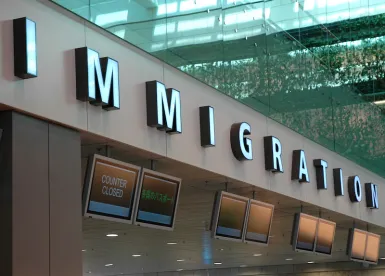U.S. Citizenship and Immigration Services (USCIS) is denying Advance Parole (AP) applications when an applicant travels internationally while the application is pending with USCIS. This represents a big adjudication shift by USCIS, which has for several years allowed certain AP applicants to travel abroad while waiting for USCIS to approve an AP application. By making this adjudication change, USCIS is reverting back to a literal reading of the law as outlined in the Form I-131’s instructions, rather than allowing greater freedom of movement for individuals who are about to become green card holders. These concerns are amplified when you consider this new practice together with more recent adjudication restrictions posed by the Buy American and Hire American Executive Order with USCIS and consular posts around the globe. In a nutshell, international travel for certain foreign nationals who are lawfully in the United States has become even more difficult.
By way of background, when filing for adjustment of status in the United States, green card applicants generally file concurrently an application for advance parole to permit international travel while the green card application is pending adjudication with USCIS. Prior to this policy change, failure to secure an advance parole prior to travel abroad resulted in the abandonment of the underlying adjustment of status unless an individual held an H-1B, H-4, L-1, L-2, K-3 fiancé, or V visa. These visa categories allow individuals to have the “dual-intent” of being temporarily present in the United States on a visa, while simultaneously pursuing a green card. Under this new USCIS policy, holders of H-1B, H-4, L-1, L-2, K-3 fiancé, or V visas will have to wait for their advance parole applications to be approved before traveling abroad or their advance parole applications will be denied by USCIS. This is significant because obtaining an advance parole during the green card process allows green card applicants to bypass the process of obtaining a visa stamp at a U.S. Consulate abroad, thereby avoiding the lengthy visa appointment wait times and possible administrative processing delays that can take months to clear while the applicant is stuck abroad. With consular officers now taking into consideration the Buy American and Hire American Executive Order, which increases the risk of visa denials resulting in individuals being unable to return to the United States, the advance parole process provides significant travel benefits.
Increasingly, however, USCIS is denying advance parole applications for applicants who travel outside the United States while their advance parole applications are still under review by USCIS, even if the applicant holds a dual-intent visa. In the denial notice, USCIS is stating that the advance parole applications are being denied due to abandonment resulting from travel abroad. While denying the advance parole application in these circumstances is technically proper, USCIS had a long-standing practice of approving advance parole applications even if the applicant travels abroad, so long as the advance parole applicant held a dual-intent visa. Specifically in the denial notices, USCIS is referencing page 6 of its Form I-131 instructions, which states ““[i]f you depart the United States before the Advance Parole Document is issued, your application for an Advance Parole Document will be considered abandoned.” Of particular concern, under this new USCIS policy, USCIS will deny an advance parole application due to abandonment even when the advance parole applicant travels using a currently valid advance parole.
This new development will hamper green card applicants and those companies that employ them because advance parole applicants must remain in the United States until the adjudication of their advance parole application, which is consistently taking 90-120 days. For those companies who rely on L-1A multi-national managers or executives, or L-1B specialized-knowledge workers who are also green card applicants, this new USCIS practice may restrict the company’s ability to manage or conduct its global business because these workers are faced with a “soft” travel restriction. The companies and L-1 workers, along with other workers who have non-immigrant visas, are faced with the decision of obtaining a new visa stamp at a U.S. Consulate abroad to return to the United States, which may be put under administrative processing or denied, or waiting the full 90-120 days before traveling abroad.





 />i
/>i

